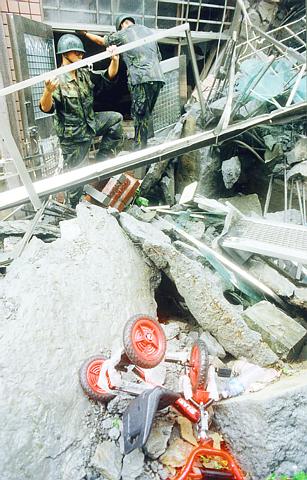Builders and government officials were given reduced sentences yesterday by the Taiwan High Court, partially reversing a lower court decision finding them responsible for the death of 28 residents at the Lincoln Mansions disaster in Taipei County.
Residents of the ill-fated buildings, who have fought for compensation since the disaster in 1997, called the ruling "incredible," and challenged the court's rulings.
"It's such an obvious and outrageous example of corruption links between the contractors and the officials. How could the court take it so lightly?" said Chou Chih-chuan (

FILE PHOTO
"Throughout the process of negotiations, we residents have been disappointed by the irresponsible attitude of the builders and the government agencies. A lot of the residents have felt so hopeless that they're on the verge of killing themselves," Chou said.
"People say the disadvantaged can have their rights protected in court. But I doubt it really," Chou said.
The Lincoln Mansions was a housing complex with over 1,000 units in Hsichih, Taipei County. Built on hillside land, the complex suffered mass damage after rain from a typhoon caused the collapse of a retaining wall behind the complex.
Twenty-eight people were killed by the collapse of several buildings and over 300 units were destroyed in the disaster. Residents of other units subsequently moved out of the complex when serious construction faults were found in the buildings after the accident.
An investigation by the prosecution found that the contractors and the designers of the complex were responsible for the accident.
Also, the investigation identified 13 Taipei County Government officials who forged documents confirming building standards in the licensing process.
The Shihlin District Court convicted 18 defendants -- five builders, one designer and twelve officials -- in 1998, while acquitting a defendant who was an official. Sentences ranged from two to 10 years prison terms.
However, the High Court reversed the lower court decision yesterday, reducing sentences for most of those convicted in the construction fault case.
The contractor for the complex, Lee Tsung-hsien (李宗賢), who was originally sentenced to 10 years and six months in jail, had his sentence reduced to four years and five months by the High Court yesterday.
The jail sentence for the designer of the residences, Lu Chung-yao (盧正堯) was reduced to eight years and six months from the original nine years and 10 months.
Moreover, the High Court found not guilty eight of the 12 previously convicted officials on the grounds of insufficient evidence. Sentences for the other guilty officials ranged from five years to seven years in jail.
Lee, the number one target of the residents' legal actions, was found guilty by the district court under charges of profiteering, falsification of documents and professional manslaughter.
However, the High Court cited a supreme court precedent in quashing Lee's profiteering charge, suggesting the charge can only be used against public servants.
An addition to the criminal proceedings, the Lincoln Mansions residents have filed civil suits against the builders and also filed requests for state compensation.
Negotiations have also continued between representatives of the residents, the builders, and the government, with meetings taking place every month.

CHAOS: Iranians took to the streets playing celebratory music after reports of Khamenei’s death on Saturday, while mourners also gathered in Tehran yesterday Iranian Supreme Leader Ayatollah Ali Khamenei was killed in a major attack on Iran launched by Israel and the US, throwing the future of the Islamic republic into doubt and raising the risk of regional instability. Iranian state television and the state-run IRNA news agency announced the 86-year-old’s death early yesterday. US President Donald Trump said it gave Iranians their “greatest chance” to “take back” their country. The announcements came after a joint US and Israeli aerial bombardment that targeted Iranian military and governmental sites. Trump said the “heavy and pinpoint bombing” would continue through the week or as long

TRUST: The KMT said it respected the US’ timing and considerations, and hoped it would continue to honor its commitments to helping Taiwan bolster its defenses and deterrence US President Donald Trump is delaying a multibillion-dollar arms sale to Taiwan to ensure his visit to Beijing is successful, a New York Times report said. The weapons sales package has stalled in the US Department of State, the report said, citing US officials it did not identify. The White House has told agencies not to push forward ahead of Trump’s meeting with Chinese President Xi Jinping (習近平), it said. The two last month held a phone call to discuss trade and geopolitical flashpoints ahead of the summit. Xi raised the Taiwan issue and urged the US to handle arms sales to

State-run CPC Corp, Taiwan (CPC, 台灣中油) yesterday said that it had confirmed on Saturday night with its liquefied natural gas (LNG) and crude oil suppliers that shipments are proceeding as scheduled and that domestic supplies remain unaffected. The CPC yesterday announced the gasoline and diesel prices will rise by NT$0.2 and NT$0.4 per liter, respectively, starting Monday, citing Middle East tensions and blizzards in the eastern United States. CPC also iterated it has been reducing the proportion of crude oil imports from the Middle East and diversifying its supply sources in the past few years in response to geopolitical risks, expanding

Pro-democracy media tycoon Jimmy Lai’s (黎智英) fraud conviction and prison sentence were yesterday overturned by a Hong Kong court, in a surprise legal decision that comes soon after Lai was jailed for 20 years on a separate national security charge. Judges Jeremy Poon (潘兆初), Anthea Pang (彭寶琴) and Derek Pang (彭偉昌) said in the judgement that they allowed the appeal from Lai, and another defendant in the case, to proceed, as a lower court judge had “erred.” “The Court of Appeal gave them leave to appeal against their conviction, allowed their appeals, quashed the convictions and set aside the sentences,” the judges